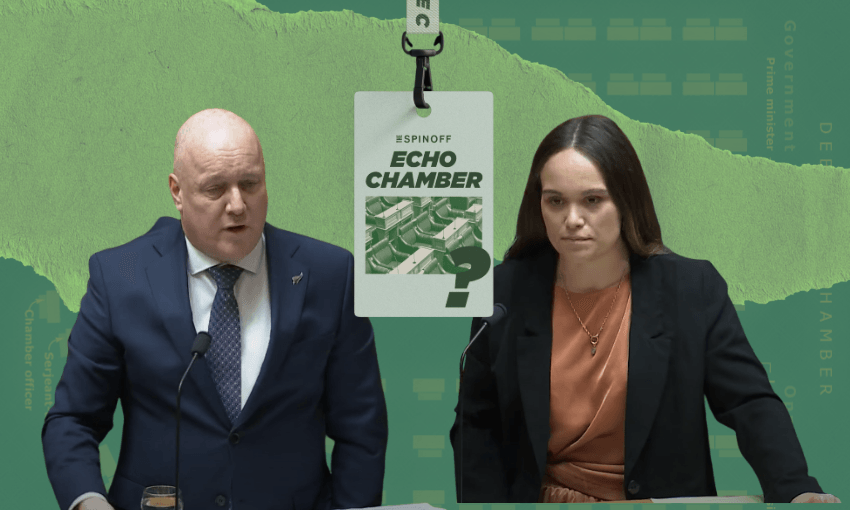Chris Luxon accidentally called Chris Hipkins ‘the prime minister’, while Labour MP Arena Williams botched her numbers in a messy parliamentary session.
The opposition benches and the press gallery get very excited whenever the prime minister trips over his words. Is it a sign that he’s crumbling under pressure? Emotionally collapsing after some less-than-ideal polling? Is it a Freudian slip, revealing his true underlying beliefs? Or could it simply be that public speaking is hard, and sometimes people say things wrong? Who’s to say? The beauty of politics, just like reality TV, is that we all get to read into it and create the narrative we choose.
When asked by Chris Hipkins how much smaller the economy is now compared to when he took office, Christopher Luxon swallowed his tongue and let out a brief, garbled noise. While attempting to refer to the “former prime minister”, he accidentally called Hipkins, “The prime minister… ah, the former prime minister needs to understand this: he created the problem.”
The Labour benches whooped. Luxon ploughed ahead, trying to make up for his gaffe by pulling out some of his favourite lines about “failed economic management” and how Hipkins is “the $66 billion man”. It was hard to hear over the tide of jeers from the opposition.
Hipkins and Luxon got into it over whether or not there are indeed thousands of kūmara-digging jobs available for unemployed 18- and 19-year-olds. Hipkins pulled stats from the NZ Institute of Economic Research showing that only 4% of businesses say hiring staff is their primary constraint for growth, while 63% say it is a lack of customers. Why is that? he asked. “Because the economy has been in a recession,” Luxon said. Again, Labour MPs jeered as if they had lulled him into admitting an embarrassing secret rather than stating an obvious fact. Luxon continued blaming the previous government: “You created the longest Covid hangover of any in the western world.”
Chlöe Swarbrick asked if the prime minister could guarantee a job for every young jobseeker in the country (he could not), and whether the cuts would “punish people into ghost jobs” or “deepen poverty and homelessness?” David Seymour complained that her questions went against standing orders. “It’s an attempt at theatre,” he said. “Seriously?!” Swarbrick said, gesturing towards noted parliamentary thespian Winston Peters. “Attempts at theatre are a regular occurrence in this House,” speaker Gerry Brownlee said.
Wednesday should have been a celebratory occasion for the government, just an hour after the Reserve Bank cut the OCR by 50 basis points to 2.5%. On previous OCR days, Luxon and Willis have indirectly taken credit for the cuts, crowing about how their fiscal management helped to get inflation under control. They didn’t seem to want to go that far this time, perhaps recognising that the jumbo cut was a response to a slower-than-expected economy. Barbara Edmonds asked Willis: “If she is taking credit for the latest interest rate cut, will she also take responsibility that this cut is because of a stagnating economy caused by her government’s inaction?” Willis quickly insisted, “I’ve taken no such credit.”
Barbara Edmonds questioning Nicola Willis in parliament.
From there, the two finance spokespeople went back and forth for what felt like an hour, quoting the only economic publication that seems to matter to the government, the NZ Herald’s Mood of the Boardroom. Willis quoted someone from Mood of the Boardroom saying the previous government was bad. Edmonds quoted someone from Mood of the Boardroom saying the current government was bad. Willis quoted someone else from Mood of the Boardroom who said Hipkins was bad. Edmonds quoted yet another person from Mood of the Boardroom, saying the government’s plan only benefited the top end.
The Mood of the Boardroom continued to haunt parliament. Erica Stanford was asked where she would be during the upcoming teachers’ strike on October 23. Stanford said she would spend the day at a curriculum roadshow, meeting the teachers and principals. Later, she returned to the floor to correct her statement: she would be at the roadshow for an entire week, not just a day. “That’s why you’re number one,” someone from the Labour side said, referring to her ranking among ministers in the Mood of the Boardroom.
One for the record
Arena Williams is often speculated about as a potential future Labour leader, but she’ll have to hope she doesn’t repeat Wednesday’s performance in the House. In a question for infrastructure minister Chris Bishop (answered by Nicola Willis in his absence), Williams thought she had found a gotcha, asking how the minister’s rhetoric about needing to deliver more infrastructure “is consistent with a $2.6 billion drop in planned spending on capital commitments by the government for the 11 months to May 2025?”
The problem was that she had misunderstood the budget documents. Those figures are from the statement of commitments, which only include projects where the Crown has signed contracts that haven’t yet started. It didn’t include many major projects that the government has committed to funding, but hasn’t confirmed a contract yet. In reality, the government has budgeted a record amount on infrastructure, something Willis was more than happy to brag about extensively.

